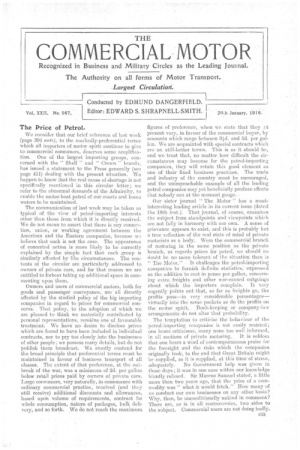The Price a Petrol.
Page 1

If you've noticed an error in this article please click here to report it so we can fix it.
We consider that our brief reference of last week (page 394 ante), to the markedly-preferential terms which all importers of motor spirit continue to give to commercial consumers, deserves some amplification. One of the largest importing groups, concerned with the " Shell " and " Crown " brands, has issued a statement to the Press generally (see page 411) dealing with the present situation. We happen to know that the real cause of shortage is not specifically mentioned in this circular letter; we refer to the abnormal demands of the Admiralty, to enable the motor-boat patrol of our coasts and home waters to be maintained.
The communication of last week may be taken as typical of the view of petrol-importing interests other than those from which it is directly received. We do not mean to assert that there is any conneaLion, union, or working agreement between the American and the Eastern companies, because we believe that such is not the ease. The appearance of concerted action is more likely to be correctly explained by the 'simple fact that each . group is similarly affected by like cireumstances. The contents of the circular are particularly addressed to owners. of private .cars, and for that reason we are entitled to forbear taking up additional space in corn menting. upon them, • • .
Owners and users of commercial motors, both for goods and passenger: conyeyanee; are all directly affected by the StUdied policy of the ,big importing companies in regard to prices far commercial concerns. That policy, to the adoption of which we are pleased to think we materially contributed by personal representations remains one of favourable treatment. We have no desireto disclose prices which are found to have been included in individual contracts, nor to pry too closely into the busineSses of other people ; we possess many details, but do not publish them broadcast. We stoutly contend for the broad principle that preferential terms must be maintained in favour of business transport of all classes. The extent of that preference, at the outbreak of the war; was a minimum of 2d. per gallon below retail prices paid by owners of. private cars. Large consumers, very naturally, in consonance with ordinary commercial practice, received (and they still receive) additional discounts and allowances, based upon volume of requirements, contract for whole consumption, nature of packages, bulk delivery, and so forth. We do not reach the maximum figures of preference, when we state that they rt present vary, in. favour of the commercial buyer, by amounts which range between 8-id. and 5d. per gallon. We are acquainted with special contracts which are on still-better terms. This is as it should be, and we. trust that, no matter how difficult the circumstances may become .for the petrol-importing companies, they will retain this good element as one of their fixed business practices. The trade and industry of the country must be encouraged, and the unimpeachable example of all the leading petrol companies may yet beneficially produce effects that nobody can at the moment gauge.
Our sister journal " The Motor " has a mostinteresting leading article in its current issue (dated the 18th inst.). That journal, of course, examines the subject from standpoints and viewpoints Whieh are not fully in harmony with our own. A sense of grievance appears to exist, and this is probably but a true ierlection of the real state of mind of private motorists as a, body. Were the commercial, branch of motoring in the same Position as the" private bran-ch, as regards prices for petrol, we should no doubt be no more tolerant of the situation: than is " The Motor.-It Challenges the potrol-iinporting companies to furnish definite -statistics,": eXpressed as the addition to cost. in pence per gallon, concarrling extra. frights and other war-caused outgoings about which the importers complain. It very cogently Points out that, so far as freights go, the profits pass--4n very_ considerable percentages— Virtually into the same pocket's as do the profits on the motor spirit. Book-keeping or company-law arrangements do not alter that probability.
The temptation to criticise the behaviour of the petrol-importing companies is not easily resisted ; one hears criticisms, many none too well informed, in all sections of private motoring. it is seldom that one hears a Word of contemporaneous praise for the foresight and the risks which the companies originally took, to the .enet that. Great Britain might be supplied, as it is supplied, at this time of stress, adeq-uately. No Government help was given in those days; it was in one case within our knowledge bluntly refused. Sir Marcus Samuel stated, a little more than two years ago, that the price of a commodity was " what it would fetch." How many of us conduct our own businesses on any other basis? Why, then, be unconditionally unkind in comment? There are, as is in all controversies, two sides to the subject. Commercial users are not doing badly..




















